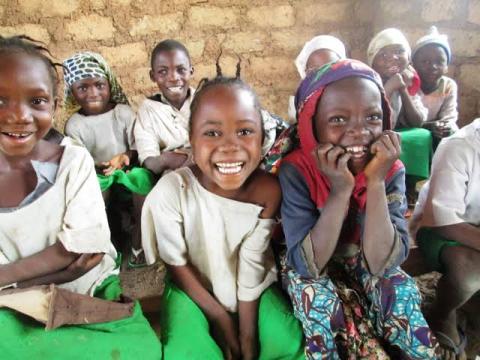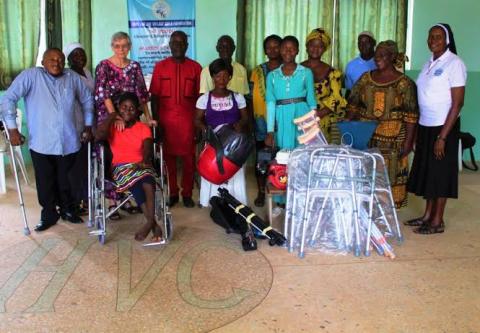
In Kaduna state, Nigeria, Hope for the Village Child Foundation, a local nonprofit, organizes routine health outreach programs in rural communities. The foundation is run by Sr. Rita Schwarzenberger, who works to promote peace in the region. (Provided photo)
Editor's note: Global Sisters Report's new series, Hope Amid Turmoil: Sisters in Conflict Areas, offers a look at the lives and ministries of women religious serving in dangerous places worldwide. The news stories, columns and Q&As in this series will include sisters in Ukraine, Nigeria, Kenya, Sri Lanka, Nicaragua and more throughout 2023.
Sr. Rita Schwarzenberger, a member of the Dominican Sisters of Peace, has been working as a missionary in Nigeria for about 50 years.
Originally from Kansas, Schwarzenberger taught English language and Christian religious studies to would-be teachers for students at government secondary schools. After moving to Nigeria, she started justice, development and peace work with the Sokoto Diocese.
Schwarzenberger, 79, currently lives in Kaduna state, north central Nigeria, advancing catechetical teachings and working with local communities and individuals to promote peace.

Like most troubled northern states in the country, Kaduna has seen its own fair share of religious violence. Ethnic tensions and growing attacks by armed bandits, who target mostly Christians and areas where they live, have exacerbated the situation.
In March, gunmen attacked a rural Christian settlement, killing 17 people. Four days later, 10 Christians were killed, heightening tensions in the region.
Schwarzenberger works on a project called "Protecting Our Communities Initiative," which is aimed at addressing lingering conflicts in local communities through sustained community-led approaches.
According to its website, the project is based on the idea of the role community members, women and youth can play in dissuading conflicts through nonviolent means.
"One of the things we do is to get communities to set up early warning response systems," she said. "We have gotten involved to work for peace in communities such as improving early warning and response systems."
Funded by the Karuna Center for Peace Building, a Massachusetts-based organization working to empower people divided to create sustainable peace, the project is implemented in partnership with the Neem Foundation, a crisis response organization.
According to its website, the Neem Foundation's mission is to promote the protection of locals and communities living in areas affected by conflicts, violence and fragility.
Schwarzenberger and her team from the Neem Foundation engage community leaders and advocacy groups to discuss peace initiatives that help prepare residents on how to detect and respond to conflicts and violence.
"You know little things can blow up overnight," she said. "You have the issue of religion in communities so things can escalate very easily. There is also a high level of tribalism."
As a pilot program, Schwarzenberger and the team at Neem Foundation worked with six communities and two local government areas in the region affected by conflicts and violent attacks by bandits. The team set up local committees in rural communities for early warning and response.
The goal for the pilot program, Schwarzenberger said, is to see what was working and what was not.
Advertisement
"This really helped because people found out that cattle rustling, for example, ended because as soon as someone sees there is a chance of violence, they would notify the response team who will take action," she said.
Schwarzenberger is all too familiar with violence in the state and said working with the locals is the best way to deal with violent escalations when they happen.
The team also trained locals in dialogue and psychosocial approach to conflict response, resolution and de-escalation.
"It's a whole integrated program and has been widely successful," she said. "We know the training has been effective in these communities and we are hoping to expand it to other communities."
Schwarzenberger said they work with other partners such as government instituted peace commissions or global peace foundations who are passionate and committed to promoting peace in local communities.
"You don't isolate peace," she said. "Any chance you get you work with anybody working for peace. We take part in anything that would promote peace because we think that peace is so crucial right now in our area."
"You don't isolate peace. Any chance you get you work with anybody working for peace. We take part in anything that would promote peace because we think that peace is so crucial right now in our area."
—Sr. Rita Schwarzenberger
To reach local communities, Schwarzenberger and her team do a radio program which she said has been very successful.
The idea, she said, is to reach the people in the remote areas so they can spread the word of countering conflicts and promoting peace while receiving feedback for future actions.
Radio is a powerful tool for communication in northern Nigeria. Most households have a radio which they use to listen to news and education programs in Hausa, the local language of the region.
During the program, Schwarzenberger and her team invite people from the rural villages to participate.
She said they normally discuss the value of dialogue or how peace can be promoted between local farmers and herders. At other times, they discuss women and their basic rights.
"It depends on the issue at the time," she said. "The idea of the program is that people themselves have to take the initiative for peace in their communities. They have to come up with the solution. The team only trains and facilitates them to be able to do that."

The Hope for the Village Child Foundation's primary focus is on children and women's development through empowerment programs. (Provided photo)
Running a local nonprofit
Schwarzenberger has been running Hope for the Village Child Foundation, a local nonprofit organization in Kaduna since January 2003.
The nonprofit, which has a staff base of 32, works with people in rural communities in the areas of health, clean water, education, sustainable agriculture and outreach programs.
"Our basic goal is to help the people to become self-reliant, independent, and to know their own dignity," she said.
The organization's primary focus is on children and women's development through empowerment programs.
"We believe that if you can't help the family, then you can't help the child," said Schwarzenberger, who runs a special program for children with disabilities or diseases such as rickets.
The organization has a clinic inside their premises. The children are routinely scheduled for corrective surgeries at orthopedic hospitals and provided with after care treatments for their recovery.

Sr. Rita Schwarzenberger, third from the left, takes a photo with members of the community who have received walking aids. (Provided photo)
Last year, more than 2,000 children were enrolled for rickets treatment.
Routinely, the organization plans an outreach program in the rural areas to investigate tropical illnesses, incidents of malaria, and genotyping to prevent sickle cell disease.
During the outreach programs, the team runs tests and returns with blood samples for use in their lab in the city. On each visit, for example, the team returns with 200 to 500 samples.
"The stress is on malaria because it is very high in this area," Schwarzenberger said. "Our staff is well trained. We have nurses, midwives and our laboratory technician is fantastic."
Schwarzenberger said that clean water is a basic essential for local communities in the area who use it for their homes. Since 1998, through the help of donors and individuals in the U.S, the organization has provided more than 400 wells in different communities.
Schwarzenberger doesn't work alone. Sr. Juliana Ekwoanya, of the Dominican Sisters of St. Catherine of Siena, moved to Kaduna in 2019 from Gusau to work with Schwarzenberger at the organization. She has been working at the nonprofit since the last four years.

Women and children celebrate the commissioning of a new water source in their community provided by the Hope for the Village Child Foundation. (Provided photo)
Before the bandits' attack became too intense, the organization ran mobile clinics for rural communities. Ekwoanya, a nurse-midwife and head of the health program, said this has been put on hold for security reasons and currently operates limited services.
"Before we received patients at any hour of the day but this has changed," said Ekwoanya, who added that there is flexibility for pregnant women and those with urgent health emergencies.
Schwarzenberger said the program also teaches people how to use sustainable environment-friendly methods of farming to increase crop yield and food production that helps to reduce poverty.
"Like the pope said in his encyclical, this is about the poor and about the earth," she said.
Targeted and displaced by bandits
In 2014, Schwarzenberger built a small convent in a rural village in Kaduna where she lived alone, surrounded by neighbors. Ekwoanya moved into the convent in 2019.
After some of the bandits' victims told the sisters that they had been marked for attacks, Schwarzenberger realized they needed to relocate.
"First of all, I didn't realize I was the target," she said. "Some people who were kidnapped overheard the abductors talking about me. Three of us in the village were targeted. We were seen as their major target."
In August 2021, the bandits attacked the convent at night. Luckily, Scharzenberger was visiting the U.S. and Ekwoanya was away on a retreat.
"They didn't know we were not around," Ekwoanya told GSR. "We had to run before we became victims."
She said the attackers damaged a lot of things, looted their valuable properties and shot at the house, including the chapel.
"We never went back again," she said.
Schwarzenberger and Ekwoanya moved out of the convent in Kaduna to where they would be safer.
Schwarzenberger said she stopped going to the Hope for the Village Child Foundation office after she was specifically targeted. She currently works from home, responding to emails, coordinating activities and attending virtual meetings.
"We live in a peaceful area now," Schwarzenberger said. "I do not go to the office now because the staff feel that if the bandits come to get me, I will be putting them at risk. A young man was kidnapped from our village and the bandits asked him, 'Where is the white sister? We still want her,' " she explained.
Schwarzenberger said she doesn't travel out of the city unless it is extremely necessary because of the associated security risks.
In March last year, a train carrying 362 passengers was attacked by suspected bandits. The rail tracks were targeted with explosives and dozens of passengers were abducted. More than 10 passengers were killed. The families of those abducted paid N800 million (about $1.7 million) before they were released some months later.
Between June and July 2022, about N653.7 million (about $1.1 million) was paid as ransom to gunmen for the release of kidnap victims in Nigeria, according to a report by SMB Intelligence, a Lagos-based security research firm.
The report showed that from July 2021 to June 2022, "no fewer than 3,420 people were abducted across Nigeria," while 564 were killed in the process.
The group said Nigerians paid about $20 million to kidnappers between 2011 and 2020.
Ekwoanya said seeing photos of the bullets in the walls at the convent after the attack instilled so much fear in the sisters that nobody was willing to take the risk of living or visiting there.
"It was not a good experience," she said. "While at the house, we couldn't sleep for many nights because of gunshots. I was traumatized severely but if you run away from the people what hope are you giving them?"
Ekwoanya said the experience has affected her mental and physical health.
"If I was not a sister, I wouldn't be here because it's risky," she said. "But when you look around and see that there are people who are helpless and have no place to run to, then you make the sacrifice to help them believing that God will also protect you but also being careful."
She quipped: "You have to be alive to carry on the mission work."





